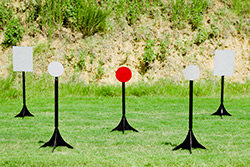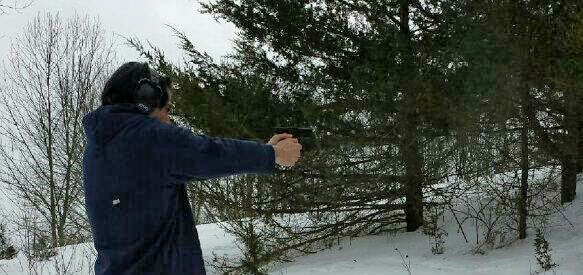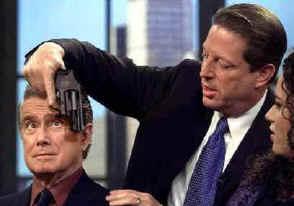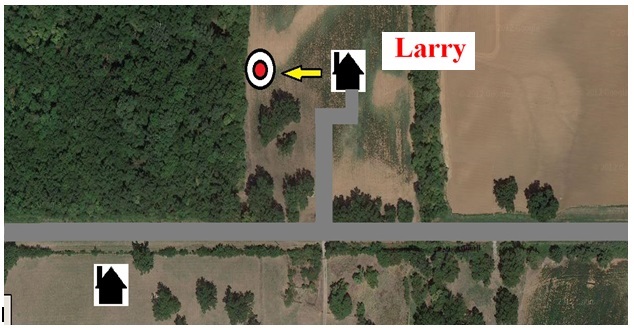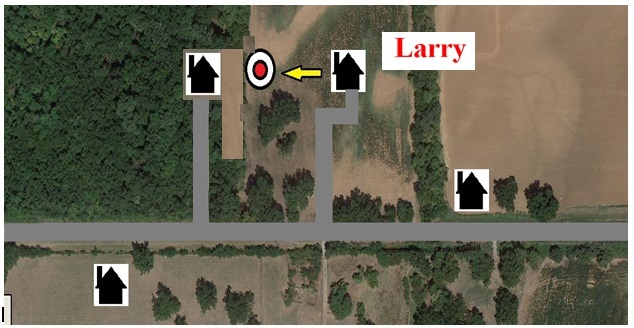Attorney Justin McShane target shooting at Harrisburg Hunters’ & Anglers’ Association.
Target Practice On Your Own Property
Target practice is an important part of any shooter’s training. Many law abiding gun owners (LAGOs) carry firearms, or keep firearms in their homes, with the intent of defending themselves in the event of a critical incident. Keeping that in mind, one can’t expect to adequately use a firearm in self-defense without the proper training.
Target practice is also a lot of fun. Many LAGOs shoot for sport, and even participate in competitive shooting. Like any other sport, competitive shooting requires a great deal of discipline and training.
A good club might have anything you need for target practice (such as Harrisburg Hunters’ & Anglers’ Association and Green Valley Sportsmans Club). Other ranges are open to the public, and have a tremendous amount of resources for your training needs (like 717 Armory and Target Master).
When it’s not possible to get out to the club or the range, can target practice be lawful on your own property? Under some circumstances, in fact it can be.
Let’s preface this by saying safety is always the number one priority when handling a firearm. Regardless of what the law requires or does not require, take as many precautions as possible to ensure that all target practice is done safely. Always be aware of what is beyond your target, and take preventative measures to ensure that you don’t hit anything you do not intend to destroy.
With respect to State law, the main provision pertaining to target shooting is found in Title 34, the Game Code.
34 Pa.C.S. § 2507. Restrictions on shooting
(a) General rule.–It is unlawful for any person during the open season for the taking of any big game other than turkey to:
(1) Shoot at any mark or target other than legal game or wildlife with a firearm of any kind or a bow and arrow.
. . .
(b) Exceptions.–This section shall not be construed to apply in any manner to:
. . .
(4) Shooting at a properly constructed target or mark or a dead tree protected by a natural or artificial barrier so that the ball, bullet or arrow cannot travel more than 15 yards beyond the target aimed at, after making due allowance for deflection in any direction not to exceed an angle of 45 degrees. Target shooting shall only be lawful when it is done:
(i) Upon property owned by the shooter or by a guest of the property owner.
(ii) Within 200 yards of the camp or other headquarters where the person shooting is quartered or is an invited guest or visitor.
Here, we find a restriction that applies “during the open season for the taking of any big game other than turkey.” Being found in the Game Code, this law purportedly aims to protect wildlife and preserve the integrity of hunting practices. Regardless, it is important to comply with this law during the appropriate time periods.
As post is limited to target practice on your own property, it is important to note that the exception to the general prohibition only applies “when it is done upon property owned by the shooter or by a guest of the property owner.” If the target practice takes place on your own property, this will not be an issue. So what exactly is required to follow the law while target shooting on your own property here in Pennsylvania? At least during the stated time period, target shooting requires a backstop which prevents bullets from traveling more than 15 yards beyond the target. It also must account for deflection of 45 degrees in any direction.
Whether you make your own backstop or the lay of the land forms a natural backstop makes no difference, as long as it serves its necessary purpose. The idea is that it must prevent your bullets from hitting things other than the intended target. The standard provided by law is fifteen yards beyond the target, and 45 degrees in any other direction when accounting for deflection. Other than the specific units of measure, for the most part it comes down to common sense.
What about the safety zone provision in 34 Pa.C.S. § 2505? Frankly, it doesn’t apply when dealing solely with target shooting on your own property.
Safety Zones 34 Pa.C.S. § 2505
a) General rule.–Except as otherwise provided in this title or to any political subdivision, its employees or agents, which has a valid deer control permit issued under section 2902(c) (relating to general categories of permits), it is unlawful for any person, other than the lawful occupant, while hunting game or wildlife, taking furbearers of any kind, or pursuing any other privilege granted by this title, to hunt for, take, trap, pursue, disturb or otherwise chase any game or wildlife or to discharge, for any reason, any firearm, arrow or other deadly weapon within or through a safety zone, or to shoot at any game or wildlife while it is within the safety zone without the specific advance permission of the lawful occupant thereof.
. . .
(c) Definition.–As used in this section, the term “safety zone” means:
(1) Except as otherwise provided in paragraph (2), the area within 150 yards around and that area which is below the highest point of any occupied dwelling house, residence, or other building or camp occupied by human beings, or any barn, stable, or other building used in connection therewith or any attached or detached playground of any school, nursery school or day-care center.
The prohibition applies “while hunting game or wildlife, taking furbearers of any kind, or pursuing any other privilege granted by this title.” Technically speaking, The Game Code does not “grant the privilege” of target shooting. Although in the context of preemption, the Commonwealth Court has held that Section 2505 “deals only with the area in which it is safe to discharge a firearm for purposes of hunting game or wildlife, not general target practice activities whether or not related to hunting.” Baird v. Township of New Britain, 633 A.2d 225, 229 (Pa. Cmwlth. 1993). As a result, this law does not appear to impact target shooting on one’s own property.
Attorney Justin McShane from 100 yards.
That being said, as discussed above, it is vital that you take every step possible to ensure the safety of those around you when target shooting. Just because conduct does not violate Section 2505 does not necessarily make it either safe or acceptable or totally legal.
Outside of the Game Code, a law from the Crimes Code could potentially come into play if target shooting isn’t practiced safely and properly: Recklessly Endangering Another Person (“REAP”). This particular crime covers a number of different circumstances and scenarios, and basically imposes a duty on citizens not to put others in harm’s way.
18 Pa.C.S. § 2705. Recklessly endangering another person
A person commits a misdemeanor of the second degree if he recklessly engages in conduct which places or may place another person in danger of death or serious bodily injury.
consciously disregards a substantial and unjustifiable risk that the material element exists or will result from his conduct. The risk must be of such a nature and degree that, considering the nature and intent of the actor’s conduct and the circumstances known to him, its disregard involves a gross deviation from the standard of conduct that a reasonable person would observe in the actor’s situation.
One is reckless when they know of a serious risk, but ignore it anyway. Even though they knew it was going to happen, or that it was likely to happen, they did it anyway. In the context of REAP, Pennsylvania courts have said that the offender must “consciously disregard a known risk.”
Suppose Larry lives on 80 acres in God’s Country, Pennsyltucky. He has no neighbors on his side of the road, although there are neighbors across the road. Larry likes to shoot in his backyard, towards the wooded area on his property. There are no people, houses, roadways, or anything but trees for miles in that direction. Larry does not have a backstop. Is he violating 34 Pa.C.S. § 2507? If it’s open season for big game other than turkey, than yes. But is he recklessly endangering another person? Probably not. For purposes of this example, let’s presume that there is no way a bullet can travel beyond Larry’s property. There is no substantial risk that shooting in that direction can put another person in danger of death or serious injury. Because of the location, there’s no substantial risk that somebody will be hit by a stray bullet.
Suppose that in a different scenario, Larry has neighbors. They just recently built a house which sits beyond his target. Larry still does not have a backstop. Aside from violating Section 2507 during the requisite time periods, Larry needs to be concerned with REAP. If the property lines are close enough, there is a substantial risk that his bullets could hit his new neighbors or others on their property. Larry should find a safer way to shoot, or he will be placing others in danger of death or serious bodily injury, and could face criminal penalties.
Shooters also need to be aware of local ordinances regarding target shooting and the blanket discharge of firearms. We understand that there is a tremendous amount of ongoing litigation regarding whether or not these ordinances are preempted. We in fact filed one of them [see U.S. Law Shield sues City of Harrisburg]. However, until the matter is resolved and the local governments are ordered to repeal these ordinances, it is important to use proper judgment. Just because a local government doesn’t have the authority to uphold an unlawful ordinance, doesn’t mean its officers will not enforce it.
That being said, it is extremely important to do everything possible to ensure that target shooting is done safely. While there are criminal and civil penalties which come with certain behavior, it is always best to go above and beyond when safety is at stake. As law abiding gun owners, and responsible gun owners, it is important that we each do our part and not become just another statistic.

